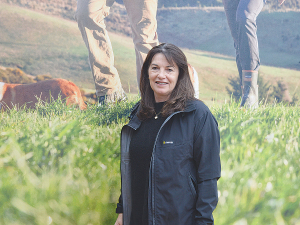Fonterra capital return could boost GDP – ANZ Report
The Fonterra divestment capital return should provide “a tailwind to GDP growth” next year, according to a new ANZ NZ report, but it’s not “manna from heaven” for the economy.
 ANZ managing director business and agri Lorraine Mapu says the significant debt reduction indicates real momentum and places the sector on a much stronger footing.
ANZ managing director business and agri Lorraine Mapu says the significant debt reduction indicates real momentum and places the sector on a much stronger footing.
Dairy farmers are shoring up their balance sheets, with almost $1.7 billion of debt repaid in the six months to March 2025.
This equates to the average dairy farmer reducing their debt - from around $22/kgMS in 2016 to $18.40/kgMS in 2025.
ANZ managing director business and agri Lorraine Mapu says the significant debt reduction indicates real momentum and places the sector on a much stronger footing.
"What we've seen from many of our farmers is that they're shoring up their balance sheets and getting themselves ready for what they need to face into the future," Mapu told Dairy News.
Fonterra is forecasting a final milk price of $10/kgMS for last season. It's also forecasting a record opening milk price of $10/kgMS for the new season, which started June 1. A $10/kgMS milk price for last season equates to around $15 billion into the New Zealand economy. Apart from paying down debt, dairy farmers are also looking at investing in technology and how it can be used to improve their businesses.
Mapu says around the boardroom or kitchen table, these strong returns have opened exciting options and investment opportunities for many of the bank's customers. At the recent Fieldays, many farmers who visited the ANZ tent spoke about technology.
"There is a lot of talk about technology. In previous years, you'd come to Fieldays and everyone would talk about tractors and hay balers and motorbikes, now they're talking about software technology on-farm," Mapu says.
For ANZ, this is key is helping farmers look towards the future.
"For those who have debt positions shored up and are looking to invest, they are looking to the future and thinking about whether technology is one of the things that will help improve their farming operations," she says.
"There's so much technology that's coming to the farm and to the orchards that can really help them improve and I think that's going to be game-changing.
"We want to help our customers understand what some of that technology is, how does it work on the farm or orchard, and how will it benefit my business."
The boost in dairy income has also given a boost to the real estate market.
In both Canterbury and the Waikato, the market for first-farm buyers is the strongest it has been in some time.
Mapu notes that many sharemilkers are stepping up to purchase their first farms - a trend supported by share and contract milkers who have built up equity in recent years, enabling them to acquire land either independently or with the backing of a larger partner.
"Land sales have also been active, with a growing number of dairy farmers looking to expand, including well-established families in the region aiming to grow from owning one dairy farm to two to three.
"Often, these are farmers who have weathered the highs and lows of the economic cycle and are now able to expand once again.
"Another thing we're seeing is signficant interest in innovative new technologies, including wearables, AI-powered cameras, and bolus technology, as farmers seek to leverage real-time data to improve efficiency on the farm.
"We're also seeing increased interest in rebuilding or replacing ageing milking sheds, particularly in Canterbury."
Recent weather events in the Bay of Plenty, Gisborne/Tairawhiti, and Canterbury have been declared a medium-scale adverse event.
DairyNZ's chief executive Campbell Parker says the 2024/25 dairy season reinforces the importance of the dairy sector to New Zealand.
A New Zealand agribusiness helping to turn a long-standing animal welfare and waste issue into a high-value protein stream has won the Australian dairy sector's top innovator award.
OPINION: A bumper season all around.
Dairy Women's Network (DWN) has announced that Taranaki dairy farmer Nicola Bryant will join its Trust Board as an Associate Trustee.
Rural Women New Zealand (RWNZ) says it welcomes the release of a new report into pay equity.
OPINION: Staying with politics, with less than nine months to go before the general elections, there’s confusion in the Labour…
OPINION: Winston Peters' tirade against the free trade deal stitched with India may not be all political posturing by the…